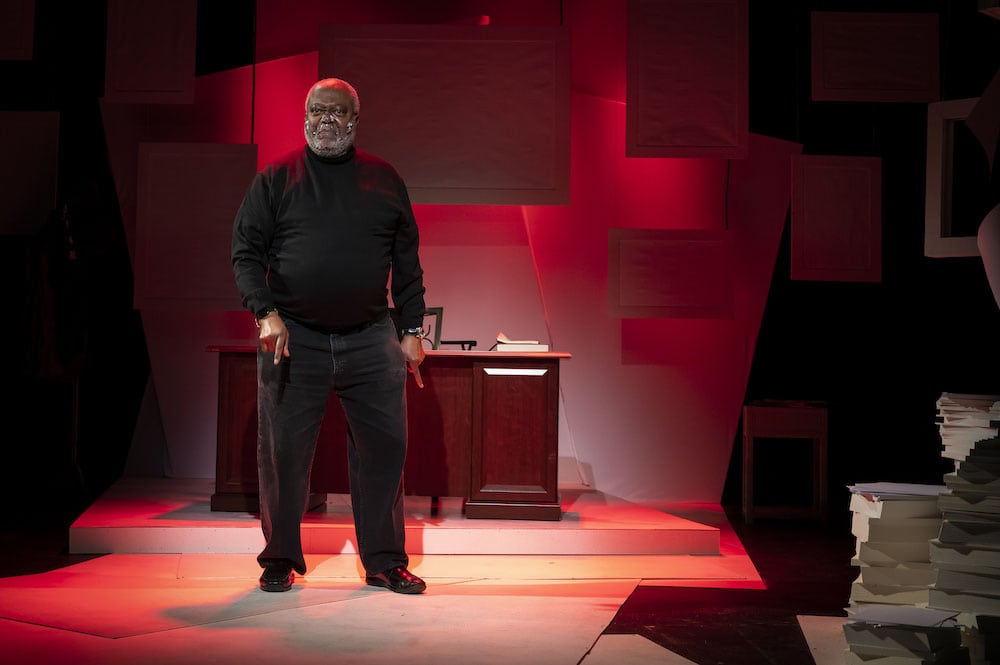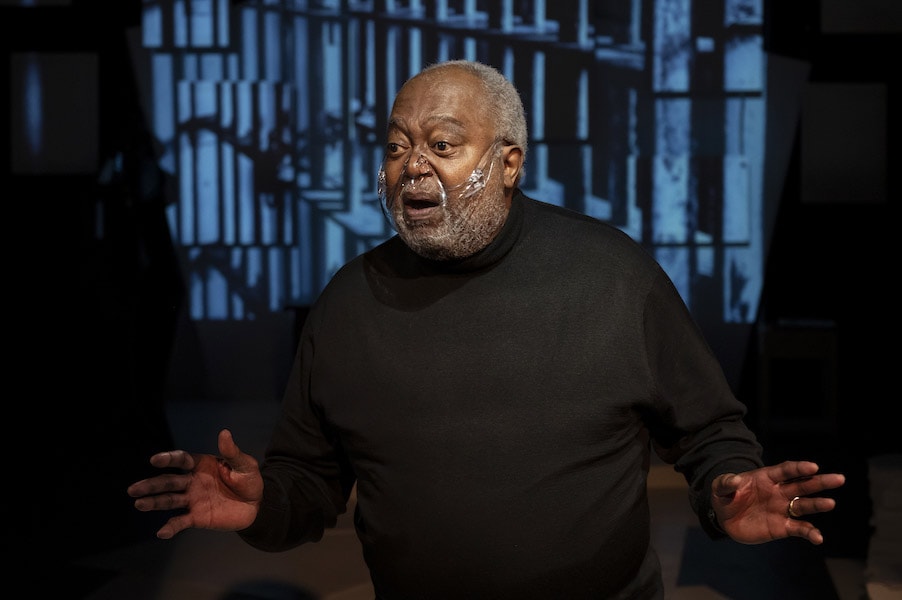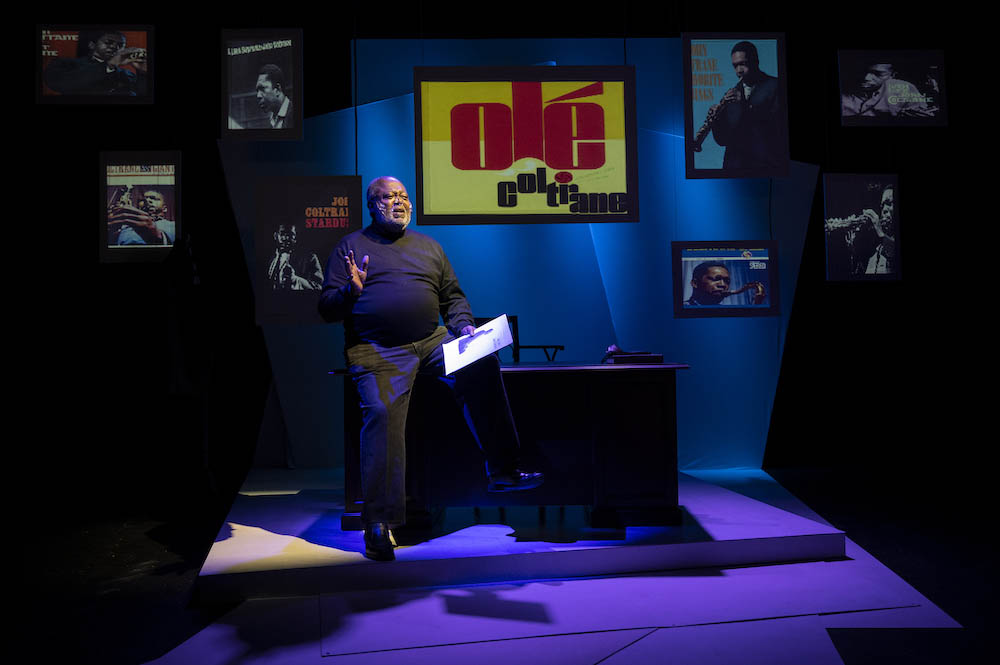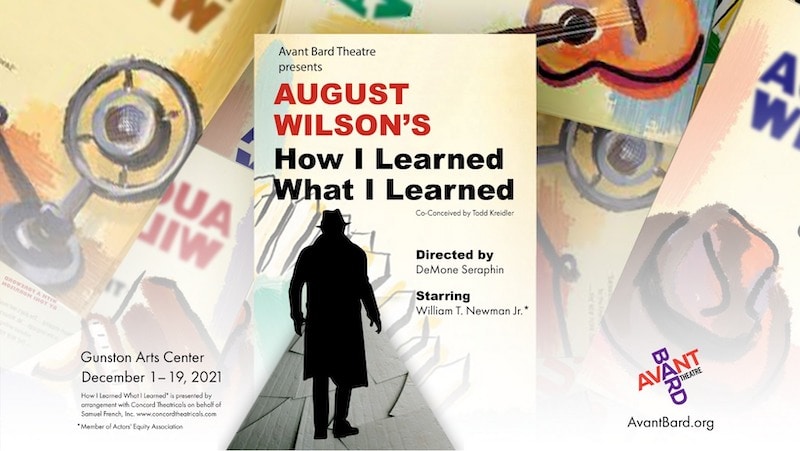When August Wilson wrote and performed his autobiographical monologue, How I Learned What I Learned, in 2003, he was already a renowned playwright, having received a Pulitzer Prize, a Tony, and other high-level awards, as well as having earned the admiration of the entire theater community.
What’s curious about Wilson’s script is that it makes no mention of any of his plays or how and why Wilson chose playwriting as his medium. Until a projection of play titles in the final moment of Avant Bard’s creditable production, an audience member unfamiliar with Wilson would never learn that he had become a playwright at all.
For the likely vast majority of the audience who know and have been moved by Wilson’s work, the most interesting thing about Wilson’s reminiscences of his youthful self is how his experiences as a child and young man resonate in his plays. He is deeply grounded, and has a strong sense of place, in the Black community of Pittsburgh. He knows what it is like to live in a milieu where casual, deadly violence is an unpredictable constant. He has an unshakeable need to maintain and assert his dignity. He knows racism up close and personal, from repeated assaults on that dignity that are too important to dismiss as “microaggressions.”

Wilson tells his story through a series of sometimes extended anecdotes, not as a chronology but more in the spirit of a jazz improv (following Wilson’s strong identification with jazz, sound designer David Lamont Wilson provides a fine jazz-dominated score for the production). Some of the stories are sweet, like one about Wilson’s schoolboy crush on a girl from whom he gets his first kiss. Some are frightening, as when he witnesses someone being stabbed to death for having said “the wrong thing to the wrong person at the wrong time.” Some tell of inspiration, as when John Coltrane’s playing in a club enchants a crowd standing outside. He is not shy about recounting awkward mistakes he made, which eventually taught him about situations in which keeping silent is the best response.
But Wilson keeps returning to what it means to be Black in American society: a story of quitting a grass-cutting job when his boss wouldn’t support him against a white woman who didn’t want him on her property; his mother’s rejection of a used washing machine offered as a prize for winning a contest instead of the promised new machine (which taught him that “sometimes nothing is better than something”); his being denied an available envelope by a bank clerk for cash he received for a check after obtrusive checking of his ID.

(A parenthetical note from my personal experience: this sort of thing keeps on happening. Today. I’ve worked professionally for years with what are called “disparity studies,” lengthy pieces used to document the continuing need for race-conscious affirmative action programs. The anecdotal portions of these studies regularly include stories that Wilson would recognize in an instant, like a Black business owner being denied a bank loan and then having the loan approved when he sends a white employee to the bank with the same financial information.)
William T. Newman Jr. takes on the task of bringing Wilson’s stories to the audience. Newman, an experienced actor, embodies Wilson the storyteller in an informal, sometimes ruefully humorous way, never self-important. At moments that call for greater intensity, such as the murder he witnesses or imagining God condemning the clerk who refused him the envelope, Newman shows the passion that Wilson often brings to his fictional characters. Given the two-hour length of the show, Newman’s performance was an achievement not only of characterization but of endurance.
Director DeMone Seraphin and the Avant Bard production team create what is both a warm and informative atmosphere for the storytelling. The set (Megan Holden) consists of a desk and chair upstage in the Gunston Theater Two black box, with the tall stacks of paper standing in for the writing to which the script never directly alludes. The lighting (John D. Alexander) is suitably subtle, highlighted by a series of video screens that show pictures of Wilson’s Pittsburgh neighborhood, book and album covers of people Wilson admired (e.g., Coltrane and poet Amiri Baraka), and photos and name cards for people who were important to Wilson. Paris Francesca gives Newman a series of costume pieces — a hat here, a sport coat there — for different parts of his stories, the most memorable of which may be the first, a T-shirt proclaiming “I was supposed to be white.”

The production is a satisfying ramble through what made the young August Wilson the person he became. The play represents Wilson’s choices about what stories he thought were important to tell about himself in 2003, when he was 58. It would have been rewarding to see what Wilson — who died of cancer two years later — might have added in a revised version of the play about his later life, about how an aspiring young poet became determined to write plays and how he educated himself to acquire the tools of that exacting craft in a way that would make the lives of Black Americans so vibrantly visible to audiences. There would have been some stirring stories there for him to tell in his own words, I expect.
Running Time: Two hours, with no intermission.
How I Learned What I Learned plays through December 19, 2021, presented by Avant Bard Theatre performing at Gunston Arts Center Theater Two, 2700 South Lang Street, Arlington VA. There is ample free parking and the venue is accessible via public transportation. For schedule details, visit avantbard.org. Tickets are $40 and are available at avantbard.org or by calling 703-418-4808. Advance-Purchase Pay-What-You-Will tickets are also on sale online for all performances beginning the Sunday before each show.
COVID Safety: Either proof of vaccination or a negative COVID test is mandatory for entry and face coverings must be worn at all times while in the building. Avant Bard follows the VDH/CDC recommendations for preserving public health.
SEE ALSO:
Avant Bard to stage August Wilson’s ‘How I Learned What I Learned’
Avant Bard Theatre celebrates a grateful return to the stage





